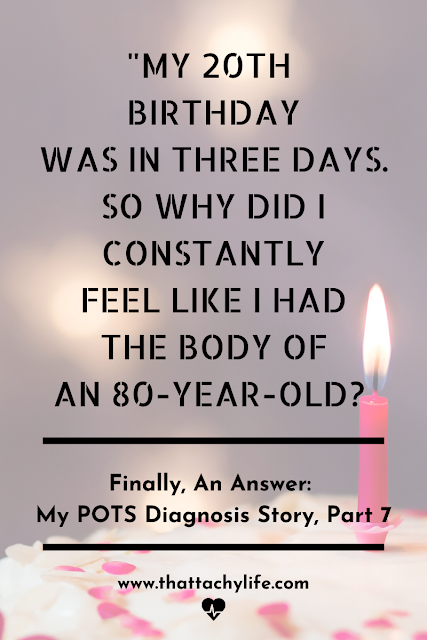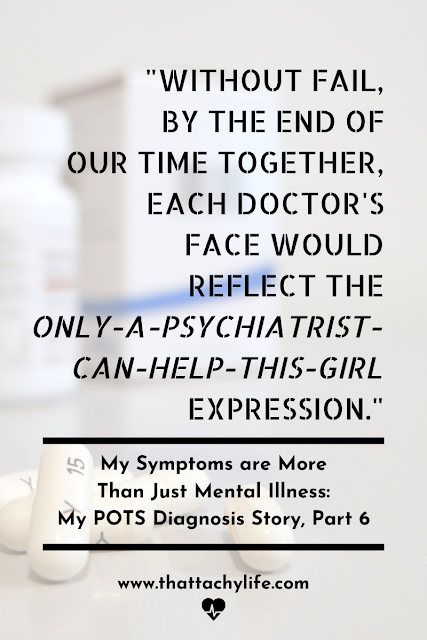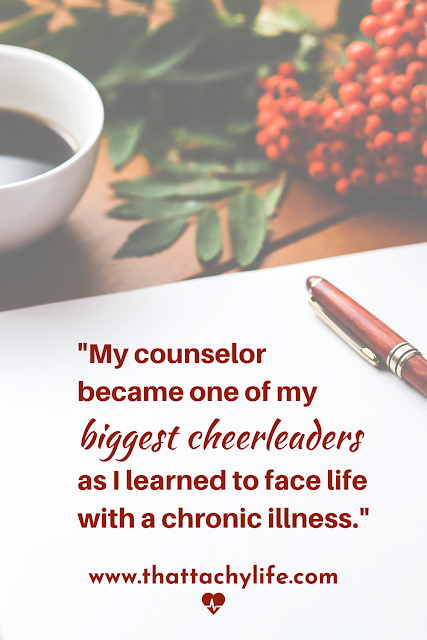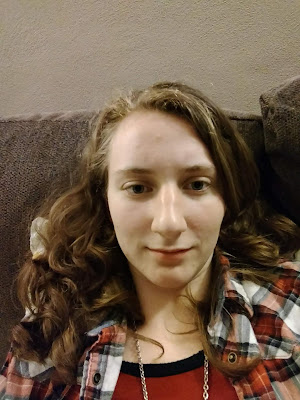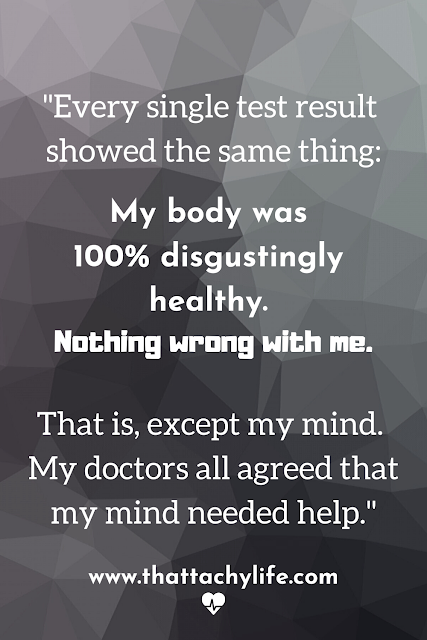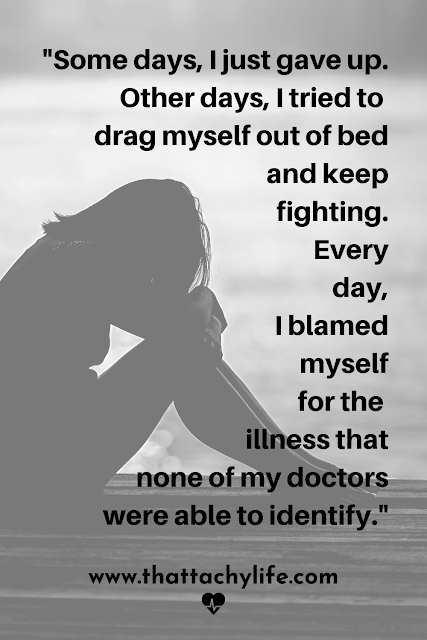The girl next to me in my CNA class once again inflated the blood pressure cuff on my arm. The air hissed out slowly as she released the valve. She wrote the numbers down, but her face was puzzled. 100 mmHg systolic, 40 mmHg diastolic. The numbers didn't make sense. They didn't fit within the range of "normal".
She called our professor over to explain what she was doing wrong. And I, the ever obedient guinea pig, sat still in my chair as another cold stethoscope was placed inside my elbow and my arm was once again squished tight by the blood pressure cuff.
"No, you did everything right," my professor told my classmate. "Her blood pressure is just wonky. She probably skipped breakfast this morning, that's all."
Class then proceeded as normal. I probably managed to nod my head appropriately a few times and fake a fair impression of paying attention, but I wasn't listening one bit.
I was busy thinking. Inside my head, a long-buried worry about my health had started to once more rear its ugly little head. 'My blood pressure is wonky.' What does that mean? I know I didn't skip breakfast this morning. Should I go to the doctor? I don't want to go to the doctor. Doctors never help anything. They definitely didn't help me when I was sick before. It's probably nothing. I'm probably fine.
As soon as I got home from class, I dug through my box of spare toiletries. I found my home blood pressure cuff, pulled it out, and took a reading. Waited anxiously while the cuff inflated and then deflated.
The numbers on the screen stared back at me: 78 mmHg systolic, 49 mmHg diastolic. My blood pressure was even more abnormal than before. It was low, too low. Too low to be healthy.
I changed the batteries in the cuff. They were old... maybe they were causing it to malfunction? Nope. New batteries gave me the same result.
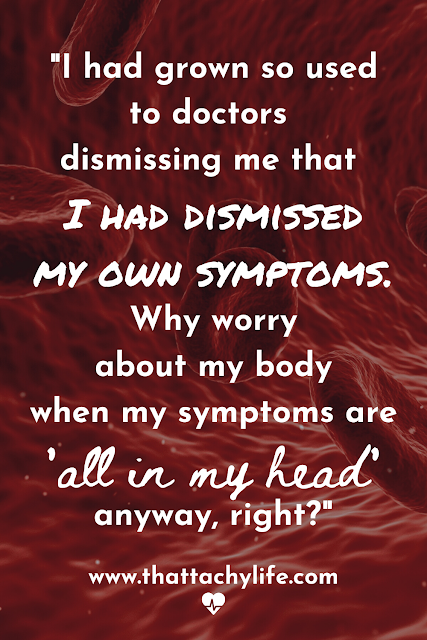
Something's wrong. Something's very, very wrong with me. I pulled out my phone and started searching the internet for an explanation. Of course, the internet didn't help my anxiety at all. (Why do I ever think searching the web for health advice is a good idea? I usually end up either with cancer or dead by the end of my search results.)
At least the things I read online made sense. All summer I had been struggling to focus, struggling to have any amount of energy. Seeing stars in my vision or even blacking out for a few seconds had become part of my normal daily routine. And anytime I tried to help my mom on the farm, my head and chest would always start pounding so hard right away that I always had to quit and return to my bed.
But I had grown so used to doctors dismissing me that I had dismissed my own symptoms. Why worry about my body when my symptoms are "all in my head" anyway, right?
That night during dinner, I mentioned my blood pressure readings to my parents. My mom instantly decided that my blood pressure cuff must be broken. There was no way my blood pressure could be that low.
So my dad tried on my blood pressure cuff and became concerned when his blood pressure reading was normal.
The blood pressure cuff wasn't broken. I was the one who was broken.
My dad set up an appointment for me at our local clinic. I hadn't been to the doctor in months, not since I had received my diagnosis of Functional Neurological Disorder. My doctors had essentially written me off as crazy. So I had given up on medical doctors; my counselor and my psychiatrist had been my only source of professional help for at least a year.
I remember an anxious, sick feeling in my stomach as I waited for my appointment at the clinic. I was afraid that whatever new doctor I saw would tell me I was perfectly fine, just like all the other doctors had. I didn't even want to hope for a diagnosis. If I had any hope, the reality was that I would probably just be disappointed all over again.
Then I began to realize that something was wrong with my pulse, too. My heart rate was totally fine as long as I was lying or sitting down. But as soon as I stood up, my pulse would always skyrocket. It was weird. I made a note to discuss my crazy heart rate with the doctor as well.
Somewhere between all my summer classes and my job in a long-term care facility, I managed to keep my appointment. I was so nervous I wanted to throw up, but I forced down my anxiety and went in to the clinic.
I was helped by a nurse practitioner instead of a doctor. In a very professional manner, the nurse practitioner at the clinic listened to my concerns and then ordered a whole bunch of tests to look for problems.
Then I waited. (Ugh, I always hate the waiting part. Don't you?)
At my follow-up appointment, the nurse practioner explained that my test results looked relatively normal. The only thing she found in my blood was a vitamin D deficiency and a slightly low iron levels. Everything else was normal. My electrocardiogram was normal. My complete blood count was "within normal range". My Lyme disease antibody test was negative. I was utterly, sickeningly normal.
Tears fell from my face as the nurse practioner went on and on, explaining that I should be thankful for my low blood pressure because many people struggle with high blood pressure.
My thoughts drowned out her voice. Why did I ever come back to a doctor? The answer will always be the same. They will never be able to help me. I'm just broken, and they can't fix me. Nobody can fix me. Nobody can see the pain I'm in, and nobody could take the pain away for me even if they cared enough to see it.
No matter how hard I tried, I couldn't stop my tears. I was utterly defeated. I felt like my whole world was crashing down on me all over again. This whole blood pressure issue was just another symptom to add to my list of things that my doctors could not explain.
The nurse practioner eventually noticed that I was crying and asked if I was okay.
"No," I told her. "I'll never be okay." I tried to keep my composure, but I couldn't. Everything just started spilling out.
I told the nurse practioner about all the doctors before who had told me I was normal just like she did. I told her I knew it wasn't all in my head. I knew something was wrong with my body. I had felt so sick for so long, and there had to be an explanation. My 20th birthday was in three days. So why did I constantly feel like I had the body of an 80-year-old? It wasn't fair. I didn't even want to be healed anymore. I just wanted answers. I just wanted to know what was wrong with my body for once in my life.
After handing me a plethora of kleenexes (which I promptly soaked with tears and snot), the nurse practitioner asked me to explain my other symptoms. We knew my blood was fine, but did I have any other ideas about what might be wrong?
I sheepishly told the nurse practioner about my online research. By matching my symptoms to articles and stories on the web, I had formed three guesses: Lyme disease, anemia, or Postural Orthostatic Tachycardia Syndrome (POTS).
We already knew that my Lyme disease test was normal. And while I did have very slight anemia, it wasn't severe enough to cause symptoms like mine. The only guess that I had left was POTS.
So the nurse practioner referred me to a cardiologist. At the same time, she warned me that "the guys up there in Cardiology think they know everything and can be pretty harsh to patients if they think you don't belong there."
I decided to take the chance.
And you know what? My cardiologist was actually really nice. I guess that means I belonged there.
I showed him my blood pressure and pulse data that I had gathered during the last two months.
"Very interesting," he said. Then he ordered a whole bunch more tests ("To make sure I don't miss a hole in your heart or something"), but he asked me if I had ever heard of POTS.
I waited months for my follow-up appointment (he must be a very busy doctor). Then my cardiologist walked in the exam room door and looked at my records. He told me that the echocardiogram, the stress test, the holter monitor readings, all the tests, were normal. My heart was fine.
My cardiologist stopped talking and looked up from my records. I think he expected me to be happy. (After all, I had just been told the good news that I didn't have a hole in my heart.)
I looked back at him stunned.
"So... there's nothing wrong with me? What do I do now?" I asked him.
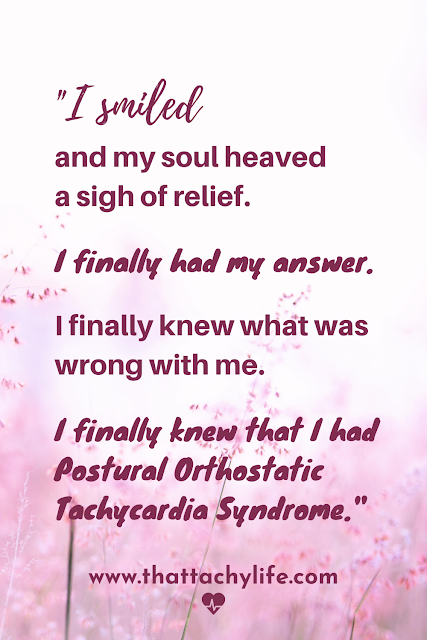 "Oh, well, there's no question that you have POTS," he said. "All the tests you did were simply necessary to rule out any other conditions. Have you ever heard of POTS?"
"Oh, well, there's no question that you have POTS," he said. "All the tests you did were simply necessary to rule out any other conditions. Have you ever heard of POTS?"I exhaled in relief as my cardiologist once again launched into an explanation of POTS. He obviously didn't remember that we'd already had this conversation at my last appointment (like I said, he must be a very busy doctor), but that was okay. I let the doctor talk as I smiled and my soul heaved a sigh of relief.
I finally had my answer. I finally knew what was wrong with me.
I finally knew that I had Postural Orthostatic Tachycardia Syndrome.
__________________________
Stay strong this week. I know life is crazy right now, but finish this semester strong. You got this.
I'm praying for you.
Until next week (or whenever I recover from all my final exams),
Bonjé Gioja
__________________________
P.S. What's the worst part about waiting for your doctor appointments? Have you ever broken down crying in front of a doctor? How did you finally find your diagnosis? I'd love to hear your story in the comments below!
P.P.S. Hey, wanna subscribe to my blog posts? It would make my day! :)

